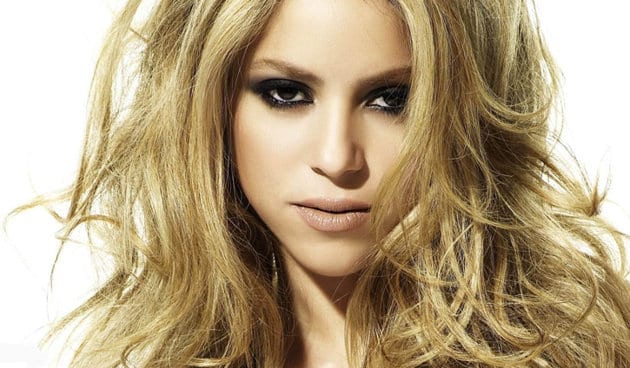Shakira has made a career out of being tough to pin down. The Columbian-born singer, songwriter, dancer, record producer, and social activist has sold 70 million albums and achieved worldwide superstardom by never playing it safe. She’s insisted on and earned an impressive amount of creative control over her music, writing or co-writing and co-producing nearly all of her own material. And she knows what works. A daring yet savvy performer, Shakira draws listeners in with her exotic beauty and seductive dance moves, then keeps them spellbound with her intelligent, poetic lyrics and mélange of diverse, spirited sounds that encompass everything from rock to folk to pop to electronic to world music genres, thanks to inspirations that range from Leonard Cohen to AC/DC and Mercedes Sosa to Skrillex.
In March, Shakira releases her tenth album, entitled Shakira. “This album is not really thematic or conceptual as some of my albums have been in the past,” she says of the decision to self-title it. “It’s more eclectic and a pretty faithful representation of all the different facets of myself as an artist and a woman — so I thought simplicity regarding the title was best in this case.”
Her first English-language album since 2009’s She Wolf, Shakira finds its creator in a transitional stage, both personally and professionally. Since that album’s release, the star found love with Spanish soccer star Gerard Piqué, and gave birth to their son, Milan. Not surprisingly, her lyrical muse is love. “I think that has always been and probably always will be my greatest source of inspiration,” she says. “And now with Milan I’m experiencing a whole new dimension of it. My family was a big inspiration on this record. They were also present for a good part of it. Gerard would visit when he could, and Milan came to the studio quite often. They are the biggest part of my day-to-day life, and without them it would have been a very different body of work.”
Sonically, the album is classic Shakira, leap-frogging from genre to genre as it does, from the melodic, heartfelt pop-rock of “23” (which she wrote for Piqué) and “The One Thing” (which she wrote about her son), to the sexy club track “Dare,” to the heavy rock stomper “Spotlight,” to the homespun, folksy rock of “Broken Record,” to the ska-punk-tinged “Cut Me Deep.” Then there are the standout duets, the first being the steamy single “Can’t Remember To Forget You” with Rihanna. “She’s one of the most unique artists out there today,” Shakira says. “And she couldn’t have been more perfect for it, because this song straddles two genres, reggae and rock, and I think we are both a good mixture of that.” The second is “Medicine,” a duet with Blake Shelton (her fellow coach on The Voice) that she wrote with Nashville veterans Hillary Lindsey and Mark Bright. “The chemistry was amazing,” she says. “We wrote that songs and two others in just three days. I had wanted to do a country record for quite some time, and I’m thrilled with the way this song came out. It also occurred to me that although it’s a very Nashville song, in Spanish I think I’ve been doing music that has a similar feel probably for most of my life — so there’s a reason I gravitated toward it.”
To help her express her vision for the album (which was recorded in Los Angeles, Poland, Spain, Brazil, London, France, Colombia, and Cairo), Shakira turned to a host of A-list collaborators, including John Hill (Santigold, Jay Z), Kid Harpoon (Florence + The Machine, Calvin Harris), Greg Kurstin (P!nk, Kelly Clarkson), Steve Mac (Kelly Clarkson, One Direction), Busbee (Lady Antebellum, Katy Perry), and The Messengers (Pitbull, Christina Aguilera).
“I worked with some amazingly talented and very diverse producers on this album,” she says. “Greg Kurstin may be one of the nicest and most talented guys I have come across, and that’s not always the easiest combo to find. He really understood my sensibilities and the sound I wanted to achieve. Busbee is just as much of a perfectionist as I am, we both live by the motto ‘the devil’s in the details.’ The Messengers brought a fun, indie, alternative approach to the table that I had a lot of fun experimenting with. Then there were producers I had collaborated with in the past — John Hill, Dr. Luke, Luis Fernando Ochoa — and that’s always enjoyable, because we’re already comfortable with each other and can jump right in.”
Famously fastidious about what she wants in the studio, Shakira admits that she loosened the reins a bit this time around. “I have a very hard time delegating,” she says. “Getting into the meat of it, working on arrangements, exploring what sound or instrument might create that ‘eureka’ moment is the most exciting part of the process to me. But luckily on this record I worked with such talented people who put me at ease and helped me achieve a balance between wanting to remain really hands-on but still being able to make time for my family. I’m really grateful for that.”
Her passion and devotion to detail are what has kept Shakira in the spotlight for so many years, with several multi-platinum albums that have spawned a string of blockbusters singles, such as “Hips Don’t Like,” “Wherever, Whenever,” “Beautiful Liar,” and “Waka Waka (This Time for Africa),” the official song of the 2010 FIFA World Cup. She is arguably Latin pop’s biggest crossover artist, racking up countless awards (including two Grammys, eight Latin Grammys, four World Music Awards, three American Music Awards, and five Billboard Music Awards) and earning a rabid fan base, millions of whom turn out for her exuberant world tours. She is also known for her social activism, having founded, at age 18, the Pies Descalzos (Barefoot) Foundation, which provides education to impoverished children through six schools in Colombia, and does outreach in Haiti and South Africa. Appointed to President Obama’s Advisory Commission on Educational Excellence for Hispanics in 2011, Shakira has met with the president at the White House and spoken about universal access to education at both Harvard and Oxford University.
In 2012, Shakira brought her spitfire personality and extensive experience to NBC’s hit show The Voice as a coach, doling out advice to aspiring artist contestants on the fourth season as well as the current one. “What I love about the show is that it’s about developing artists for the long haul and helping them find their strengths and unique qualities that set them apart, instead of simply judging them,” she says. “I wish as a young artist that I’d had a similar experience when starting out, because when you’re surrounded by many people telling you what you should be or how you should sound, it’s sometimes hard to hold onto what is really you.”
Now more than 20 years into her career, and having just released her tenth album, Shakira has earned the right to do things her way. “I think my goal at the end of the day is always just to be honest and true to myself as an artist, and that the music reflects who I am and what I’m feeling at the time that I made it,” she says. “Since this album evolved over a longer period than the others and over a very eventful time of my life, it is one of the more eclectic albums I’ve made — but I think people will find that the sound is still very much Shakira.”
###
[March 2014]


